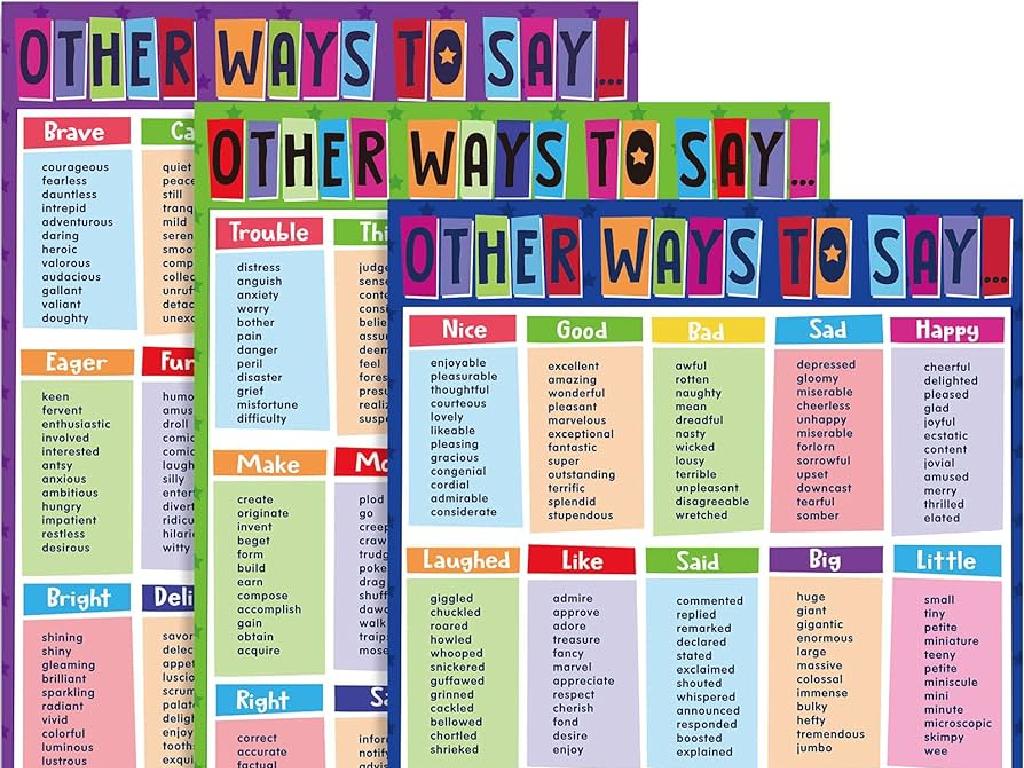Identify Thesis Statements
Subject: Language arts
Grade: Eighth grade
Topic: Persuasive And Opinion Writing
Please LOG IN to download the presentation. Access is available to registered users only.
View More Content
Identifying Thesis Statements in Persuasive Writing
– What is persuasive writing?
– Defining thesis statements
– A thesis statement declares your main point or argument.
– The role of thesis in essays
– It guides the essay’s structure and presents the writer’s stance.
– Why thesis statements matter
– Thesis statements anchor the essay, providing clarity and direction.
|
This slide introduces students to the concept of persuasive writing with a focus on the importance of thesis statements. Begin by explaining persuasive writing as a style that aims to convince readers to accept a particular viewpoint. Emphasize that a strong thesis statement is crucial as it expresses the main argument of the essay and sets the tone for the entire piece. Discuss how a well-crafted thesis statement can make an essay more compelling and logical. Encourage students to think of thesis statements as the foundation upon which their arguments are built. Provide examples of effective thesis statements and analyze why they work. For homework, ask students to find examples of thesis statements in opinion articles or essays and bring them to the next class for discussion.
Understanding Thesis Statements
– Define a thesis statement
– A thesis statement expresses the main idea of an essay.
– Thesis shapes the essay
– It guides the essay’s structure and presents the argument.
– Examples: strong vs. weak
– ‘School uniforms limit freedom’ vs. ‘School uniforms are bad’
– Analyzing thesis effectiveness
– Evaluate why some theses are stronger and more persuasive.
|
This slide introduces the concept of a thesis statement and its critical role in essay writing. Begin by defining a thesis statement as the central argument or claim that the writer intends to prove in their essay. Emphasize how a well-crafted thesis guides the structure and direction of the essay, providing a clear path for the reader. Provide examples of strong and weak thesis statements, highlighting the specificity and clarity in strong statements versus the vagueness in weak ones. Engage students in analyzing the effectiveness of different thesis statements and discuss what makes a thesis persuasive and compelling. This will set the foundation for students to write their own thesis statements in future writing assignments.
Characteristics of a Strong Thesis Statement
– Thesis must be debatable
– A good thesis invites discussion by presenting a viewpoint that can be challenged or debated.
– Should be specific and focused
– Avoid broad topics; narrow down to a particular aspect or idea.
– Acts as essay’s roadmap
– It outlines the main points that will be discussed, guiding the essay’s structure.
– Reflects clear position
– It doesn’t just state a fact; it takes a stand on an issue.
|
When teaching students about thesis statements, emphasize that a strong thesis is the backbone of a persuasive essay. It should clearly communicate the essay’s main argument and be specific enough to guide the writing process. A debatable thesis ensures that the essay will be engaging and not just a presentation of facts. Encourage students to practice crafting thesis statements that are narrow in scope, which makes the argument more focused and easier to support. Use examples to show how a thesis statement can direct the structure of an essay, much like a roadmap. Lastly, ensure that students understand the importance of taking a clear position to persuade the reader.
Finding the Thesis: Strategies and Practice
– Strategies to spot thesis statements
– Look for a sentence that summarizes the main point
– Practice with sample paragraphs
– Identify the thesis in provided examples
– Discuss findings in groups
– Share and compare with peers
– Understand thesis significance
|
This slide is aimed at teaching students how to identify thesis statements within persuasive and opinion texts. Start by discussing strategies such as looking for a clear, concise statement that presents the main argument or point of the text. Then, have students practice these strategies by identifying thesis statements in sample paragraphs. Afterward, organize a group discussion where students can share their findings and discuss the different thesis statements they’ve identified. This will help them understand the importance of a thesis statement in structuring an argument and how it guides the direction of the text. Encourage students to explain why they believe a particular sentence is the thesis and to consider the effectiveness of the thesis statements they find.
Crafting Your Own Thesis Statement
– Steps to develop a persuasive thesis
– Identify your topic, take a stance, and write a clear, concise statement.
– Workshop: Crafting a thesis
– Use a given topic to create your own thesis in class.
– Peer review of thesis statements
– Exchange papers with classmates to critique thesis statements.
– Importance of a strong thesis
|
This slide is aimed at guiding students through the process of creating a thesis statement for their persuasive essays. Start by explaining the steps to develop a strong thesis: choosing a topic, deciding on a stance, and formulating a clear and concise statement that encapsulates the main argument. During the workshop, provide a common topic and have students draft their own thesis statements. Follow up with a peer review session where students exchange their work and provide constructive feedback on each other’s thesis statements. Emphasize the importance of a strong thesis as the backbone of their essay, guiding the direction and focus of their writing. Encourage students to use specific, assertive language and to avoid vague statements. The activity will help them understand the critical role a thesis plays in persuasive writing and improve their ability to critique and refine their own and others’ thesis statements.
Thesis Statement Workshop: Crafting Your Argument
– Discuss a persuasive essay topic in groups
– Each group creates a thesis statement
– A clear, concise argument that states your position
– Present your thesis to the class
– Receive and reflect on feedback
– Consider the constructive criticism to refine your thesis
|
This class activity is designed to engage students in understanding the importance of a strong thesis statement in persuasive writing. Divide the class into small groups and have each group choose a topic for a persuasive essay. Guide them to craft a thesis statement that clearly presents their argument. Each group will then present their thesis to the class, opening the floor for feedback from peers. Encourage constructive criticism and open discussion to help students refine their thesis statements. As a teacher, provide examples of effective thesis statements and facilitate the feedback process to ensure it is productive and supportive. This activity aims to enhance students’ critical thinking and collaborative skills while reinforcing the concept of thesis statements in persuasive writing.
Conclusion & Homework: Crafting Your Argument
– Recap the thesis statement significance
– Homework: Write a persuasive paragraph
– Choose a topic you’re passionate about
– Include a distinct thesis statement
– Ensure your thesis is debatable and focused
– Get ready to present your paragraph
|
As we conclude today’s lesson on the importance of a strong thesis statement in persuasive writing, assign students the task of writing a persuasive paragraph on a topic of their choice. Emphasize that their paragraph should clearly present a thesis statement that expresses the main argument. Remind them that a good thesis is specific and takes a clear position on the topic. For the next class, students should be prepared to share their paragraphs and discuss how their thesis statements guide their arguments. This exercise will help reinforce their understanding of thesis statements and improve their persuasive writing skills.






